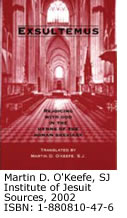| |
|

Currently, there is controversy about how to translate Latin liturgical texts into vernacular. The missal is being retranslated, as
demanded by the Roman instruction Liturgiam authenticam (2001),
which called for greater literal accuracy than had the earlier
instruction Comme le prevoit (1969). In this context, one reads
this book with great interest. The author presents every hymn in
the post-conciliar Liturgy of the Hours in his original translation
(although unfortunately the English and Latin strophes are
not always printed directly opposite each other). The translations
are not intended for singing, but for reflection and prayerful
reading. It is the author’s goal to be “as reverent, accurate, and
dignified” as possible (xi), and I think he succeeds at this goal.
Hymns present special difficulties to the translator. It
is not possible to preserve the meter and be literally accurate.
One must take liberties with the original text in order to create
a poem in meter, or forgo the limitations of a fixed syllable
pattern in order to translate each word and line accurately.
Matthew Britt, osb, provided both types of translation for the
pre – Vatican II liturgy in The Hymns of the Breviary and Missal:
his literal translation, often with an explanation of difficulties
in grammar and vocabulary, and also a freer, high-quality
poetic version of each hymn from master poets.
O'Keefe takes a different and original approach, partway
between the options of Britt, and calls it free verse.
He employs as many words as
needed, without concern for rhyme
or meter, to convey the full meaning
of the Latin original. (Very often,
iambic patterns result.) O'Keefe is
expansive, erring in the direction of
interpretative surplus. For example,
Christ removes not just our "death"
(mortem), but the "death that we
have earned" (307). This provides
a fuller sense of the original meaning.
For the student needing help
comprehending the Latin original,
O'Keefe's free approach will
not always be clear. For this, Britt
remains a useful resource, but this
is limited since the Latin hymn texts
have now been restored to a more original form (as called for
in Sacrosanctum concilium, #93), and many new Latin hymns
have been added to the post-conciliar Liturgy of the Hours.
As the author notes in his preface, we lack English translations
of the Office hymns useable for the liturgy, and so the
treasury of Latin hymns is unjustly neglected. May this work of
O'Keefe help to foster greater interest in Latin and vernacular
hymns of the post-conciliar Liturgy of the Hours.
© 2013 Archdiocese of Chicago: Liturgy Training Publications,
3949 South Racine Ave, Chicago IL 60609
|
 |
 |
 |
is a monk and priest of Saint John's Abbey in Collegeville, Minnesota, and a professor of theology and
liturgical music at Saint John's University.
|
 |
|
|